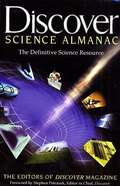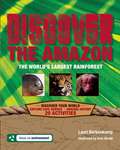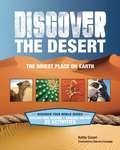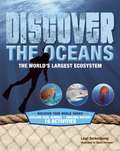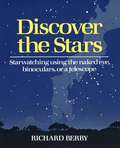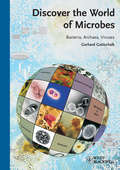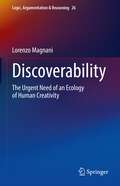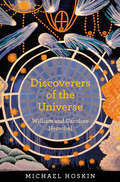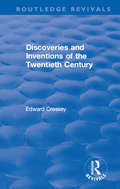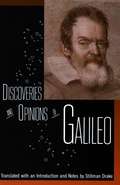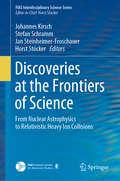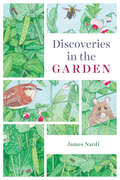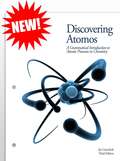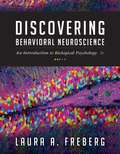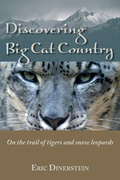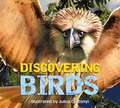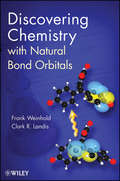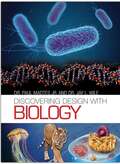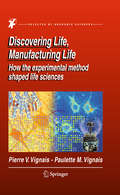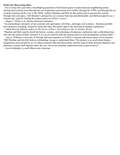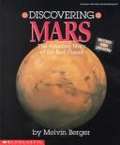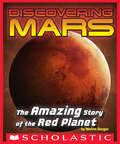- Table View
- List View
Discover Science Almanac
by Bryan Bunch Jenny TesarThe first and only science reference book of its kind features the latest breakthroughs in science--from technology to medicine. 50 illustrations.
Discover the Amazon
by Blair Shedd Lauri BerkenkampFrom avoiding predators to navigating through the jungle without a compass, this innovative guide provides kids with the vital tools one would need if lost in the Amazon. Offering practical survival techniques based on real stories, children will learn lessons that can be adapted to almost any outdoor situation, such as making fire, deciphering animal tracks, and using the natural world for all to create necessary supplies. Opening with an informative section on the region and its people, this essential resource combines history and science in a fun and engaging way. Facts and sidebars on the local creatures and plants are interspersed along with 15 activities for the home or classroom-from making a fishing spear to determining how much water is needed to stay healthy.
Discover the Desert
by Sam Carbaugh Kathryn CeceriDelving into a seemingly dry and barren ecosystem, this fun-filled activity book closely examines the desert landscape and shows how many exciting discoveries it holds. Exploring native plants and animals and depicting the extreme temperatures, rough terrain, and vast distances in detail, this lively reference describes lost civilizations as well as today's desert-dwelling cultures. "Try This" science and history activities are also included-from creating mirages and fashioning an Anasazi clay bowl to growing salt crystals and even assembling a cactus dish terrarium. Demonstrating why adventurers have always been drawn to the world's deserts, this entertaining overview also provides education on the environment, examining how the health of the planet depends on the careful treatment of the desert's many resources.
Discover the Oceans
by Lauri Berkenkamp Chuck ForsmanFrom both a historical and scientific point of view, above and below the surface, this engaging guide brings the world's oceans to life through fun facts, illustrations, and in-depth information. Interactive activities appear throughout, ranging from making solar stills and simple fishing spears to experimenting with a homemade diving bell and figuring out how much water it really takes to survive. With the oceans being the least explored environment on Earth, this reference illuminates some of the most incredible and surprising plants and animals as well as how to survive and navigate these vast expanses.
Discover the Stars: Starwatching Using the Naked Eye, Binoculars, or a Telescope
by Richard BerryFor everyone who has looked up at the stars on a clear night and longed to know more about them, here is the perfect introduction and guide to discovering the stars.Discover the Stars leads you on a tour of all the stars and constellations visible with the naked eye and introduces you to deep-sky objects that can be seen with binoculars or a simple telescope. The tour is conducted by the editor of Astronomy magazine, Richard Berry, whose two-color, computer-plotted sky maps and clear instructions make stargazing fun and productive from your first night out.The heart of Discover the Stars is two sections of big, beautiful sky maps and charts. The first section features twelve maps that show the entire sky overhead as it appears during each month of the year. These outline all the constellations visible anywhere in the Northern Hemisphere, and the accompanying text reveals the rich ancient mythology that surrounds the star groups.The second section is made up of twenty-three star charts that depict smaller regions of the sky in great detail. These charts give the names of key stars and lead you to fascinating features such as stars with unusual colors, double stars, variable stars, nebulae, and galaxies.Separate chapters cover basics, such as how the stars move through the sky, how to find your way around the moon and the planets, making an astronomer's flashlight, and choosing and using a telescope -- all in terms that are easy to grasp and remember.Discover the Stars is the perfect introduction to the heavens, simple enough to be useful if you're just starting out but packed with enough information to keep you learning and enjoying the stars for years to come.From the Trade Paperback edition.
Discover the World of Microbes: Bacteria, Archaea, Viruses
by Gerhard GottschalkThis title is an essential primer for all students who need some background in microbiology and want to become familiar with the universal importance of bacteria for all forms of life. Written by Gerhard Gottschalk, Fellow of the American Academy of Microbiology and one of the most prominent microbiologists in our time, this text covers the topic in its whole breadth and does not only focus on bacteria as pathogens. The book is written in an easy-to-read, entertaining style but each chapter also contains a `facts' section with compact text and diagrams for easy learning. In addition, more than 40 famous scientists, including several Nobel Prize winners, contributed sections, written specifically for this title. The book comes with color figures and a companion website with questions and answers. Key features: Unique, introductory text offering a comprehensive overview of the astonishing variety and abilities of Bacteria Easy-to-read, fascinating and educational Written by one of the best known microbiologists of our time Color images throughout Each chapter has a compact tutorial part with schemes on the biochemistry and metabolic pathways of Bacteria Comes with a companion website with questions and answers
Discoverability: The Urgent Need of an Ecology of Human Creativity (Logic, Argumentation & Reasoning #26)
by Lorenzo MagnaniThe book analyses the concept of discoverability, and some current epistemological problems related to it, with a special attention to science. It shows that discoverability is closely related to the sustainability of human creativity in an "eco-cognitive" perspective. Advocating the need of an integral ecology and leveraging the important concept of abduction, it demonstrates that an ecology of human creativity should have priority over other needs, i.e that the first ecological duty is to protect and sustain discoverability. Enhancing discoverability will protect human creativity, and it is exactly human creativity, a form of innovative abductive cognition, that can promote the implementation of the other kinds of ecology. The author guides readers through a comprehensive discussion on the concept of discoverability, eco-cognitive situatedness, and eco-cognitive openness and closure alike. By describing some key real-world examples, he highlights the main challenges that are currently posed to human creativity and epistemic integrity. He also describes future eco-cognitive settings, discussing the problem of overcomputationalism and suggesting a reinterpretation of the role of human knowledge. Overall, this book fills an important gap in the literature on the nexus abduction – creativity – discovery, offering a source of inspiration to philosophers, epistemologists, and cognitive scientists. Yet, it also addresses researchers in other disciplines interested in the problems of scientific discovery and epistemic integrity of research.
Discoverers of the Universe: William and Caroline Herschel
by Michael HoskinDiscoverers of the Universe tells the gripping story of William Herschel, the brilliant, fiercely ambitious, emotionally complex musician and composer who became court astronomer to Britain's King George III, and of William's sister, Caroline, who assisted him in his observations of the night sky and became an accomplished astronomer in her own right. Together, they transformed our view of the universe from the unchanging, mechanical creation of Newton's clockmaker god to the ever-evolving, incredibly dynamic cosmos that it truly is. William was in his forties when his amateur observations using a homemade telescope led to his discovery of Uranus, and an invitation to King George's court. He coined the term "asteroid," discovered infrared radiation, was the first to realize that our solar system is moving through space, discovered 2,500 nebulae that form the basis of the catalog astronomers use today, and was unrivalled as a telescope builder. Caroline shared William's passion for astronomy, recording his observations during night watches and organizing his papers for publication. She was the first salaried woman astronomer in history, a pioneer who herself discovered nine comets and became a role model for women in the sciences. Written by the world's premier expert on the Herschels, Discoverers of the Universe traces William and Caroline's many extraordinary contributions to astronomy, shedding new light on their productive but complicated relationship, and setting their scientific achievements in the context of their personal struggles, larger-than-life ambitions, bitter disappointments, and astonishing triumphs.
Discoverers of the Universe: William and Caroline Herschel
by Michael HoskinDiscoverers of the Universe tells the gripping story of William Herschel, the brilliant, fiercely ambitious, emotionally complex musician and composer who became court astronomer to Britain's King George III, and of William's sister, Caroline, who assisted him in his observations of the night sky and became an accomplished astronomer in her own right. Together, they transformed our view of the universe from the unchanging, mechanical creation of Newton's clockmaker god to the ever-evolving, incredibly dynamic cosmos that it truly is. William was in his forties when his amateur observations using a homemade telescope led to his discovery of Uranus, and an invitation to King George's court. He coined the term "asteroid," discovered infrared radiation, was the first to realize that our solar system is moving through space, discovered 2,500 nebulae that form the basis of the catalog astronomers use today, and was unrivalled as a telescope builder. Caroline shared William's passion for astronomy, recording his observations during night watches and organizing his papers for publication. She was the first salaried woman astronomer in history, a pioneer who herself discovered nine comets and became a role model for women in the sciences. Written by the world's premier expert on the Herschels, Discoverers of the Universe traces William and Caroline's many extraordinary contributions to astronomy, shedding new light on their productive but complicated relationship, and setting their scientific achievements in the context of their personal struggles, larger-than-life ambitions, bitter disappointments, and astonishing triumphs.
Discoveries and Inventions of the Twentieth Century (Routledge Revivals)
by Edward CresseyThe book is written for those, young and old, who wish to have a non-technical account of the great scientific and material triumphs which man has achieved and is achieving in their own day; and it seemed desirable to give first place to those theories, facts, and accomplishments which are now exercising the greatest influence upon human life. For science exists not so much to tickle the intelligences of the few as to brighten the lot of the many.
Discoveries and Opinions of Galileo
by Galileo GalileiDirecting his polemics against the pedantry of his time, Galileo, as his own popularizer, addressed his writings to contemporary laymen. His support of Copernican cosmology, against the Church's strong opposition, his development of a telescope, and his unorthodox opinions as a philosopher of science were the central concerns of his career and the subjects of four of his most important writings. Drake's introductory essay place them in their biographical and historical context. Translation and notes by Stillman Drake
Discoveries at the Frontiers of Science: From Nuclear Astrophysics to Relativistic Heavy Ion Collisions (FIAS Interdisciplinary Science Series)
by Stefan Schramm Johannes Kirsch Jan Steinheimer-Froschauer Horst StöckerWith contributions by leading theoreticians, this book presents the discoveries of hitherto hidden connections between seemingly unrelated fields of fundamental physics. The topics range from cosmology and astrophysics to nuclear-, particle- and heavy-ion science. A current example concerns the sensitivity of gravitational wave spectra to the phase structure of dense nuclear and quark matter in binary neutron star collisions. The contributions by Hanauske and Stoecker as well as Banik and Bandyopadhyay relate the consequent insights to hot dense nuclear matter created in supernova explosions and in high-energy heavy-ion collisions. Studies of the equation of state for neutron stars are also presented, as are those for nuclear matter in high-energy heavy-ion collisions. Other reviews focus on QCD-thermodynamics, charmed mesons in the quark-gluon plasma, nuclear theory, extensions to the standard general theory of relativity, new experimental developments in heavy ion collisions and renewable energy networks. The book will appeal to advanced students and researchers seeking a broad view of current challenges in theoretical physics and their interconnections.
Discoveries in the Garden
by James B. NardiEvery square inch of soil is rich with energy and life, and nowhere is this more evident than in the garden. At the tips of our trowels, a sun-driven world of microbes, insects, roots, and stems awaits—and it is a world no one knows better than James Nardi. A charming guide to all things green and growing, Nardi is as at home in prairies, forests, and wetlands as he is in the vegetable patch. And with Discoveries in the Garden, he shows us that these spaces aren’t as different as we might think, that nature flourishes in our backyards, schoolyards, and even indoors. To find it, we’ve only got to get down into the dirt. Leading us through the garden gate, Nardi reveals the extraordinary daily lives and life cycles of a quick-growing, widely available, and very accommodating group of study subjects: garden plants. Through close observations and simple experiments we all can replicate at home, we learn the hidden stories behind how these plants grow, flower, set seeds, and produce fruits, as well as the vital role dead and decomposing plants play in nourishing the soil. From pollinators to parasites, plant calisthenics to the wisdom of weeds, Nardi’s tale also introduces us to our fellow animal and microbial gardeners, the community of creatures both macro- and microscopic with whom we share our raised beds. Featuring a copse of original, informative illustrations that are as lush as the garden plants themselves, Discoveries in the Garden is an enlightening romp through the natural history, science, beauty, and wonder of these essential green places.
Discovering Atomos: A Grammatical Introduction to Atomic Processes in Chemistry
by Jen GreenholtThis handy workbook is divided into six simple lessons that make learning the principles of basic chemistry fun and manageable.
Discovering Behavioral Neuroscience: An Introduction to Biological Psycology,3rd Edition
by Laura A. FrebergDISCOVERING BEHAVIORAL NEUROSCIENCE: AN INTRODUCTION TO BIOLOGICAL PSYCHOLOGY, 3rd Edition is written to appeal to a broad range of readers interested in a college-level introduction to biological or physiological psychology. Whether readers have a strong science background or are novices who feel intimidated at the prospect of the subject matter, this book's clear writing, high-interest examples, learning aids, and numerous illustrations will keep them interested and engaged. The book includes classic concepts, current topics, and cutting-edge research to provide readers with a foundational understanding of the structure and function of the nervous system and its relationship to both typical and disordered human behavior.
Discovering Big Cat Country: On the trail of tigers and snow leopards (Island Press E-ssentials)
by Eric DinersteinWith their elusive and solitary nature, tigers and snow leopards are a challenge for even the most seasoned field biologists to track and study. Yet scientist and conservation leader Eric Dinerstein began his career in the heart of Nepal's tiger country and the perilous Himalayan slopes of the snow leopard, where he discovered the joys--and frustrations--of studying wildlife in some of the most unpredictable and remote places on Earth. In Discovering Big Cat Country, Dinerstein tells the story of two formative journeys from his early days as a biologist: two and a half years as a young Peace Corps Volunteer in the jungles of Nepal and later, as a newly-minted Ph.D., an arduous trek to search for snow leopards in the Kashmir region of India. In these chapters, excerpted from Tigerland and other Unintended Destinations, Dinerstein paints an evocative picture of the homelands and habits of two fascinating predators, and recalls local partners and fellow conservationists who inspired him with their passion for wild places.
Discovering Birds: The Ultimate Handbook to the Birds of the World
by Thomas NelsonTake a journey through the fascinating world of birds with this tactile book jam-packed with scientific facts and incredible full-color illustrations.From soaring eagles to colorful parrots, this book explores the diverse array of birds that inhabit our world. Learn about each species' life cycle, nesting habits, migration patterns, behaviors, physical characteristics, and distinct songs.Inside you'll find:Profiles of 100+ amazing birds across a range of habitatsFun facts highlighting the fascinating features of each speciesIncredible full-page illustrationsDesigned to inspire curiosity and a love of nature, Discovering Birds promises to encourage a lifelong appreciation of learning and the great outdoors.
Discovering Chemistry With Natural Bond Orbitals
by Frank WeinholdThis book explores chemical bonds, their intrinsic energies, and the corresponding dissociation energies which are relevant in reactivity problems. It offers the first book on conceptual quantum chemistry, a key area for understanding chemical principles and predicting chemical properties. It presents NBO mathematical algorithms embedded in a well-tested and widely used computer program (currently, NBO 5.9). While encouraging a "look under the hood" (Appendix A), this book mainly enables students to gain proficiency in using the NBO program to re-express complex wavefunctions in terms of intuitive chemical concepts and orbital imagery.
Discovering Design with Biology
by Dr Paul Madtes Jr. And Dr. Jay L. WileDiscovering Design with Biology is a laboratory-based high school biology course is the first biology course a college-bound student should take. It gives the student an introduction to how living organisms are designed, how they interact with one another, and how they interact with their physical environment. Students are taught how biologists classify life, the chemical processes that make life possible, the structures of RNA and DNA, and the designs of the different cells found in living organisms. Students also learn the means by which photosynthesis, cellular respiration, and cellular reproduction occur. They then learn the current state of biotechnology. With the molecular and cellular basis of life covered, the students are then given a survey of the different kinds of organisms found in nature: archaea, bacteria, protists, fungi, invertebrates, vertebrates, and plants. The students then learn the biogeochemical cycles that keep environments hospitable to life, which leads to a discussion of ecosystems. Throughout the course, students see that life is the result of design and that organisms have been given the ability to adapt to their surroundings. In addition, they learn various problems associated with the modern evolutionary synthesis.
Discovering Design with Chemistry
by Jay L. WileDr. Jay L. Wile presents a new high school course in Chemistry for Christians. The book has a content-rich website with video explanations to help students who don't understand the explanations in the text, videos of cool experiments the student can't do at home, and links to other information related to what is being discussed in the text.
Discovering Life, Manufacturing Life
by Paulette M. Vignais Pierre V. VignaisThis book tells the story of how thinkers, over time, have dared to explore using experimental devices and how the experimental method established itself and took a predominant role in the life sciences. While life sciences continue to advance and knowledge becomes more widespread and accessible, philosophers now focus on problems of ethics particularly with respect to the reproductive functions that contemporary biology is able to manipulate and modify. Looking at the stunning progress made by scientific thought over the last five centuries we might ask ourselves what were the triggering factors that lead to the experimental method. How did this logical and objective approach to the exploration of various enigmas in nature arise and spread at a particular moment in time in the western world? Was there an influence from the social, religious or political context? Was the energy of a few individuals sufficient to initiate such a revolution? The authors of this book take us on journey of the mind, from the ancient roots of scientific rationality to today's irresistible trend in genetic manipulation, particularly focused on human beings. Inevitably this will lead the reader to view the way in which science is done today under a new light. A fascinating discussion, based on concrete examples and experiments, provides food for thought, not only with respect to the experimental method itself, but also regarding the organization of science as it exists today and how it is perceived.
Discovering Mars: A History of Observation and Exploration of the Red Planet
by William Sheehan Jim BellFor millenia humans have considered Mars the most fascinating planet in our solar system. We’ve watched this Earth-like world first with the naked eye, then using telescopes, and, most recently, through robotic orbiters and landers and rovers on the surface. <p><p>Historian William Sheehan and astronomer and planetary scientist Jim Bell combine their talents to tell a unique story of what we’ve learned by studying Mars through evolving technologies. What the eye sees as a mysterious red dot wandering through the sky becomes a blurry mirage of apparent seas, continents, and canals as viewed through Earth-based telescopes. Beginning with the Mariner and Viking missions of the 1960s and 1970s, space-based instruments and monitoring systems have flooded scientists with data on Mars’s meteorology and geology, and have even sought evidence of possible existence of life-forms on or beneath the surface. This knowledge has transformed our perception of the Red Planet and has provided clues for better understanding our own blue world. <p><p>Discovering Mars vividly conveys the way our understanding of this other planet has grown from earliest times to the present. The story is epic in scope—an Iliad or Odyssey for our time, at least so far largely without the folly, greed, lust, and tragedy of those ancient stories. Instead, the narrative of our quest for the Red Planet has showcased some of our species’ most hopeful attributes: curiosity, cooperation, exploration, and the restless drive to understand our place in the larger universe. Sheehan and Bell have written an ambitious first draft of that narrative even as the latest chapters continue to be added both by researchers on Earth and our robotic emissaries on and around Mars, including the latest: the Perseverance rover and its Ingenuity helicopter drone, which set down in Mars’s Jezero Crater in February 2021.
Discovering Mars: The Amazing Story of the Red Planet
by Melvin BergerThis book talks about the features, history, and current and future exploration of Mars. [This text is listed as an example that meets Common Core Standards in English language arts in grades 4-5 at http://www.corestandards.org.]
Discovering Mars: The Amazing Story of the Red Planet (Journeys 2014)
by Melvin Berger Mary Kay CarsonRecognized as an exemplar text by the Common Core State Standards, this updated version of DISCOVERING MARS features a new cover and the latest information and discoveries about the red planet.Featuring incredible photos and new information about the latest research into Mars, this updated edition of DISCOVERING MARS covers everything about the great red planet, from past to present.Topics covered include myths and facts about life on Mars, a history of NASA's Mars research, including the Rover missions, and ideas about our potential future relationship with the planet. With its lively text narrative and beautiful color photos, students and teachers alike will enjoy learning everything there is to know about Mars.
